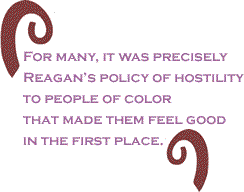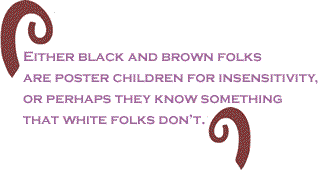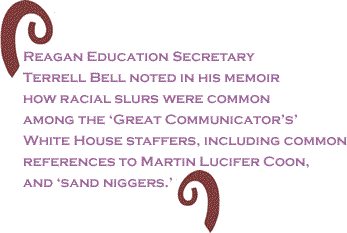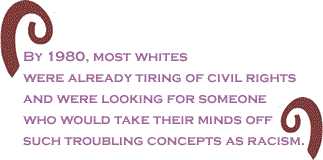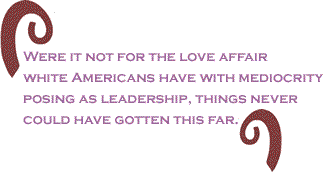
|
|||||||||||||||||||||
 |
If one needs any more evidence that whites and people of color live in two totally different places, politically and psychically, one need only look at the visual evidence provided by the death of Ronald Reagan. More to the point, all one needs to know about this man and his Presidency can be gleaned by looking even haphazardly at the racial and ethnic makeup of the crowds flocking to his ranch, or his library to pay tribute. So too will it be apparent from the assemblage lining the streets of DC for his funeral procession, or gathering in the Capitol Rotunda to pay respects to their departed hero. They are, and will be – in case you missed it or are waiting for the safest prediction in the history of prognostication – white. Far whiter, one should point out, than the nation over which Reagan presided, and even more so than the nation into whose soil he will be deposited within a matter of days.
Doubtful. Most of them, after all, are quite used to never seeing black and brown folks, since the vast majority of whites live in communities with virtually no people of color around them.
That the mourners wouldn’t notice the overwhelming monochromy of their throng is no surprise. But it has been more than a little interesting that no intrepid reporter - or at least someone pretending to be such a creature – has thought to ask the obvious question about the racial makeup of those losing sleep over the death of Ronald Reagan, versus those who frankly aren’t. After all, there are really only two possible interpretations of the sanguine reaction by people of color to Reagan’s death: namely, either black and brown folks are poster children for insensitivity, or perhaps they know something that white folks don’t, or would rather ignore.
The former of these is not likely – after all, millions of black folks actually forgave George Wallace for God’s sake when he did a partial mea culpa for his racist past before his death – but the latter is as certain as rain in Seattle. What white folks ignore, but what most black folks can never forget, is how Reagan opposed the Civil Rights Act at the time of its passage, calling it an unwarranted intrusion on the rights of businesses, and never repudiated his former stand. Or that as Governor of California, Reagan dismissed the struggle for fair and open housing, by saying that blacks were just “making trouble” and had no intention of moving into mostly white neighborhoods. Perhaps they have a hard time forgetting that of all the places Reagan could have begun his campaign for the Presidency in 1980, he had to choose Philadelphia, Mississippi: a town famous only for the 1964 murder of three civil rights workers. And perhaps they recall that the focus of his speech that day was “state’s rights,” a longstanding white code for rolling back civil rights gains and longing for the days of segregation.
Maybe they have burned in their memories the way Reagan attacked welfare programs with stories of “strapping young bucks” buying T-Bone steaks, while hardworking taxpayers could only afford hamburger, or how Reagan fabricated a story about a “welfare queen” from Chicago with 80 names, 30 addresses, and 12 Social Security cards, receiving over $150,000 in tax-free income. That Reagan picked Chicago as the site of this entirely fictional woman, and not some mostly white rural area where there were plenty of welfare recipients too, was hardly lost on African Americans.
Perhaps they recall that Reagan supported tax exemptions for schools that discriminated openly against blacks. Perhaps they recall how his Administration cut funds for community health centers by 18 percent, denying three-quarters-of-a-million people access to services; how they cut federal housing assistance by two-thirds, resulting in the loss of about 200,000 affordable units for renters in urban areas. Or how Reagan opposed sanctions against the racist South African regime, and even denied that apartheid, under which system blacks could not vote, was racist, noting that its policies were “more tribal than racial.” And it isn’t surprising that few if any Salvadorans or Guatemalans who came to the U.S. in the 1980s, fleeing from violence in their countries, were to be seen placing flowers outside Reagan’s library either.
After all, the former were forced to seek refuge here precisely because Reagan was so intent on funneling money and arms to the murderous death-squad governments who were responsible for killing so many of their countrymen and women; and the latter no doubt recall how Reagan brushed off the genocidal policies of Guatemalan dictator Rios Montt – whose scorched earth tactics, especially against the nation’s indigenous resulted in at least 70,000 deaths – by saying he was getting a “bum rap” on human rights, and was instead a man of “great personal commitment,” who was dedicated to “social justice.” That whites would view much of this as irrelevant, even whining or sour grapes on the part of communities of color, is only proof positive that for many if not most such folks, the opinions of, and even the humanity of black and brown persons with whom they share a nation is of secondary importance to the fact that Reagan - as many have been gushing these past few days – “made them feel good again.” But how can healthy people feel good about a leader who does and says the kinds of things mentioned above? Obviously the answer is by denying that racism matters, or that its victims count for anything. Even more cynically, it is no doubt true that for many of them, it was precisely Reagan’s policy of hostility to people of color that made them feel good in the first place. By 1980, most whites were already tiring of civil rights and were looking for someone who would take their minds off such troubling concepts as racism, and instead implore them to “greatness,” however defined, and “pride,” however defined, and flag waving. Whites have long been more enamored of style than substance, of fiction than fact, of fantasy than reality. It’s why we have clung so tenaciously to the utterly preposterous version of our national history peddled by textbooks for so long; and it’s why we get so angry when anyone tries to offer a correction.
As Randall Robinson points out in his recent book, Quitting America, when such subjects are broached, the operative response from much of the white tribe is little more than, “Oh, that.” Yes white man, that. That exactly. That thing we were raised to gloss over, to speak of in hushed tones, as if by our diminished volume or failure to audibilize it, it will go away; that perhaps they will forget about it, and instead join with us in praise of our country, since that is most definitely how so many of us envision it. White people, especially those who are upper-middle class and above, have no reason on Earth to be aware of the truth, let alone to dwell on it. The truth is, after all, so messy, so littered with the bodies of dead Nicaraguans, and dead Haitians murdered by Duvalier while Reagan stood by him; so soiled by his support for Saddam Hussein. Better to ignore all that, and to go mushy before the pictures of Reagan in his cowboy hat, to remember a President who, for all of his murderous policies abroad and contempt for millions at home, at least never got a blow job in the Oval Office.
This is the twisted psychosis of growing up privileged, as a member of the dominant group: a group that must view their nation as fair and just, as a place struck off by the literal hand of God, as a place where “average” guys like Ronald Reagan can become “great leaders.” As a place where an “aw shucks” smile, and a profound lack of knowledge about the details of public policy – or even the names of foreign leaders – is not only not cause for embarrassment, but yet another good reason to vote for someone; where refusing to read up on important policy details prior to a key international meeting so one can watch The Sound of Music on TV, is seen as endearing rather than cause for a recall. This is why we get people like George W. Bush, for those who haven’t figured it out yet. Oh sure, vote fraud and a pliant Supreme Court help, but were it not for the love affair white Americans have with mediocrity posing as leadership, things never could have gotten this far. It’s why a bona fide moron like Tom DeLay can brag about not having a passport (because, after all, why would anyone want to travel abroad and leave “Amur’ca,” even for a day) and not be seen as the epitome of a blithering idiot, and why he could probably be elected again and again in thousands of white dominated congressional districts in this country, and not merely in Texas. Having to grapple with the real world is stressful, and people with relative power and privilege never know how to deal with stress very well. As such, they long for and applaud easy answers for the stress that occasionally manages to intrude upon their lives: so they blame people of color for high taxes, failing schools, crime, drugs, and jobs they didn’t get; they blame terrorism on “evil,” and the notion that they hate our freedoms: a belief one can only have if one really thinks one lives in a free country in the first place. In other words, delusion is both the fuel that propels people like Ronald Reagan forward in political life, and then makes a rational assessment of his legacy impossible upon his death. I think this is why so many white people remember him fondly, and are truly crestfallen at the thought of his physical obsolescence: simply put, much of white America needs Ronald Reagan; a father figure to tell them everything is going to be O.K.; a kindly old Wizard of Oz, to assure them that image and reality are one, even when the more cerebral parts of our beings tend towards an opposite conclusion. With Reagan gone, maintaining the illusion becomes more difficult. But knowing white folks – I am after all one of them, and have been surrounded by them all of my life – I have little doubt that where there’s a will to remain in la-la land, we will surely find a way. Reagan has been released from the lie, finally, and may his soul find peace among the millions of dearly departed victims of his policies around the world. Meanwhile, the rest of us must pull back the curtain on all phony heroes, Reagan among them, lest we create many millions more. Tim Wise is an antiracist essayist, activist and father, He can be reached at [email protected]. |
June
10 2004 |
|||||||||
|
|||||||||
|
|
|||||||||
| Printer Friendly Version | |||||||||
 |
|||||||||
| |
|||||||||
| |
|||||||||





















